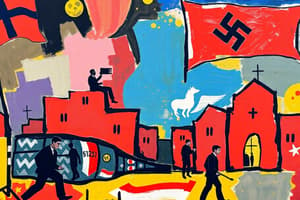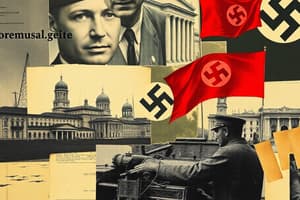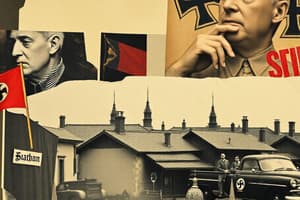Podcast
Questions and Answers
What underlying factor contributed to the causes of World War II by intensifying competition for military superiority?
What underlying factor contributed to the causes of World War II by intensifying competition for military superiority?
- Economic Instability
- Political and Ideological Tensions
- Nationalism and Territorial Ambition
- Military Buildup and Arms Race (correct)
Which aspect of Great Depression's aftermath helped create a fertile ground for political extremism according to the text?
Which aspect of Great Depression's aftermath helped create a fertile ground for political extremism according to the text?
- Rapid industrial growth
- Destabilized world economies (correct)
- Cultural innovation
- Social welfare programs
What played a crucial role in facilitating the Holocaust through the organized persecution and murder of Jewish people and other minorities?
What played a crucial role in facilitating the Holocaust through the organized persecution and murder of Jewish people and other minorities?
- Fascism and Communism
- Concentration Camps (correct)
- Territorial Expansion
- Military Buildup
Which factor exacerbated tensions and created a climate of fear and distrust, contributing to the causes of World War II?
Which factor exacerbated tensions and created a climate of fear and distrust, contributing to the causes of World War II?
During the Holocaust, what was established to confine and segregate Jewish people and other minority groups?
During the Holocaust, what was established to confine and segregate Jewish people and other minority groups?
Among the causes of World War II, which factor involved countries seeking to expand their territorial control and influence at the expense of their neighbors?
Among the causes of World War II, which factor involved countries seeking to expand their territorial control and influence at the expense of their neighbors?
What was the primary purpose of establishing ghettos during the Holocaust?
What was the primary purpose of establishing ghettos during the Holocaust?
Which of the following is true about the conditions in the ghettos established during the Holocaust?
Which of the following is true about the conditions in the ghettos established during the Holocaust?
Which of the following statements accurately describes the purpose of concentration camps during World War II?
Which of the following statements accurately describes the purpose of concentration camps during World War II?
What differentiated the Nazi extermination camps from other concentration camps during World War II?
What differentiated the Nazi extermination camps from other concentration camps during World War II?
What was a distinct feature of the killing methods employed in the major extermination camps mentioned in the text?
What was a distinct feature of the killing methods employed in the major extermination camps mentioned in the text?
How did the ghettos established during the Holocaust relate to the subsequent establishment of concentration camps?
How did the ghettos established during the Holocaust relate to the subsequent establishment of concentration camps?
Flashcards
Causes of World War II
Causes of World War II
A global conflict influenced by nationalism, military buildup, political tensions, and economic instability after WWI.
Ghettos During the Holocaust
Ghettos During the Holocaust
Overcrowded districts where Jews and minorities were confined, with poor conditions and limited resources.
Concentration Camps
Concentration Camps
Camps designed for forced labor that evolved into sites for mass murder, medical experiments, and inhumane treatment.
Major Extermination Camps
Major Extermination Camps
Signup and view all the flashcards
The Holocaust
The Holocaust
Signup and view all the flashcards
Nationalism and Territorial Ambition
Nationalism and Territorial Ambition
Signup and view all the flashcards
Military Buildup and Arms Race
Military Buildup and Arms Race
Signup and view all the flashcards
Political and Ideological Tensions
Political and Ideological Tensions
Signup and view all the flashcards
Economic Instability
Economic Instability
Signup and view all the flashcards
Study Notes
World War II and the Holocaust: Exploring Their Interconnected Past
World War II and the Holocaust are two of the most significant events in modern history, deeply intertwined through the horrific acts of persecution and genocide. To understand their connections, let's delve into their origins and the specifics of the ghettos and concentration camps that shaped this period.
Causes of World War II
World War II was a global conflict that followed the fragmentation of the peace treaty at the end of World War I. Several underlying factors contributed to the causes of this war:
- Nationalism and Territorial Ambition: Countries sought to expand their territorial control and influence, often at the expense of their neighbors.
- Military Buildup and Arms Race: A rapid arms race ensued, fueled by an intense competition for military superiority.
- Political and Ideological Tensions: The rise of totalitarian regimes, particularly fascism and communism, exacerbated tensions and created a climate of fear and distrust.
- Economic Instability: The Great Depression and its aftermath created a fertile ground for political extremism and destabilized world economies.
Ghettos During the Holocaust
The Holocaust, a period of organized, widespread persecution and murder of Jewish people and other minorities, was facilitated by the establishment of ghettos. Ghettos were overcrowded, walled-off districts where Jews and other targeted groups were confined in hopes of controlling and isolating them. Ghettos were established in cities across Europe, such as Warsaw, Krakow, and Berlin.
Ghetto conditions were abysmal, with limited access to food, water, and medical care. Overcrowding resulted in the spread of disease, starvation, and despair. The ghettos were a prelude to the extermination camps—the next stage of the Holocaust's unfolding.
Concentration Camps
Concentration camps were established primarily to detain and exploit forced laborers, but they quickly evolved into instruments of mass murder. The most infamous of these camps were the Nazi extermination camps, designed specifically to kill Jews, Roma, homosexuals, and other targeted groups.
Six major extermination camps were constructed during World War II: Auschwitz-Birkenau, Treblinka, Sobibór, Belzec, Majdanek, and Chelmno. Each camp had a distinct killing method, such as gas chambers, mass shootings, or open-air pits. The camps were not just places of death and destruction; they were also sites of medical experimentation and inhumane treatment of prisoners.
In the end, World War II and the Holocaust share a horrific history. The causes of World War II led to the rise of totalitarian regimes, creating a climate of fear and persecution that ultimately resulted in the Holocaust. Ghettos and concentration camps were the physical manifestations of the horrors that unfolded during this dark period in history. As we honor the victims and survivors of World War II and the Holocaust, it is essential to remember their stories and work to ensure that their suffering never happens again.
Studying That Suits You
Use AI to generate personalized quizzes and flashcards to suit your learning preferences.




